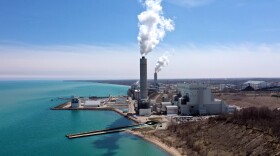Editor's note: This piece was originally published on Oct. 16, 2018.
Lake Effect has recently been airing interviews with journalists and politicians that Bonnie North recorded in Brussels and Berlin as a part of a journalist exchange program sponsored by the RIAS Berlin Commission.
"From my perspective and from my experiences, people will try to cross any kind of border, however it is built. Even if it is built like a fortress."
However, Peter Keup is neither a politician nor a journalist — he's a historian. But in 1981, he was a prisoner in a Stasi prison in Dresden. He had tried to escape to the west and was caught in the attempt.
"According to the propaganda, the wall in Berlin and the border between the two German states was a protection measurement — to protect us from the class enemy, and so on. Of course, the border and the wall was there that we can't escape from the country," Keup recalls. "From my perspective and from my experiences, people will try to cross any kind of border, however it is built. Even if it is built like a fortress."
Today, Keup lives in Berlin, is finishing his dissertation and gives tours of the former Stasi prison Berlin-Hohenschönhausen. He notes that a desire for separation, common during his imprisonment, is once again resurfacing.

"The protectionism, which is quite common at the moment, it's not helpful. We have to face the problems of the world and we have to deal with them," says Keup. "To build a wall and to make us live on an island, or a tower — is this the world we want to live in?"
He agreed to share his experiences with Lake Effect's Bonnie North at the former Checkpoint Charlie in Berlin, the infamous cold war boundary between East and West:
You can also follow Bonnie North's journey and see additional photos through her blog, Radio Free Bonnie, that she was writing on location.












